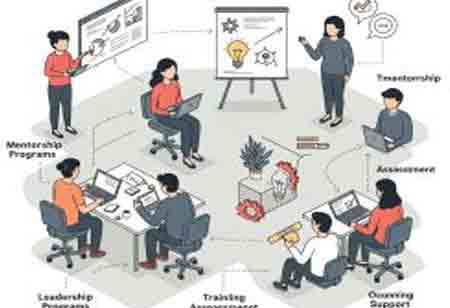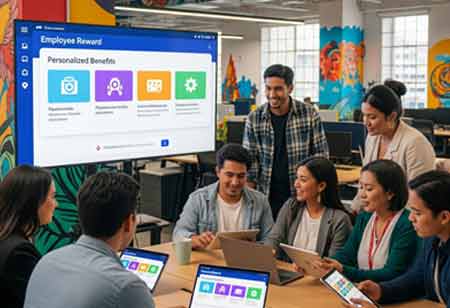THANK YOU FOR SUBSCRIBING
Be first to read the latest tech news, Industry Leader's Insights, and CIO interviews of medium and large enterprises exclusively from Hrtech Outlook
THANK YOU FOR SUBSCRIBING

By
HR Tech Outlook | Tuesday, April 15, 2025
Stay ahead of the industry with exclusive feature stories on the top companies, expert insights and the latest news delivered straight to your inbox. Subscribe today.
The importance of effective leadership has never been more pronounced as organizations face complex challenges and seek to drive growth, innovation, and organizational success. As business environments become increasingly dynamic, the demand for leaders capable of navigating uncertainty, managing diverse teams, and inspiring change continues to rise. Leadership development has evolved from a traditional training activity into a strategic initiative that fosters skills that align with immediate organizational needs and long-term objectives.
Key Trends Shaping the Future of the Industry
Technology is crucial in reshaping leadership development. Virtual learning platforms, artificial intelligence-driven tools, and personalized learning experiences have made it easier for organizations to deliver leadership programs to a broader audience, regardless of geographical boundaries. This has led to the rise of hybrid learning models that combine face-to-face interaction with online learning, making leadership development programs more accessible and flexible.
Data-driven decision-making is becoming integral to the leadership development process. By leveraging analytics, organizations can assess the effectiveness of leadership programs, track progress, and fine-tune their approach. With leaders increasingly held accountable for business outcomes, the demand for leadership solutions that directly align with organizational goals is growing. Leadership development programs are now seen as a training tool and a strategic investment to improve an organization's performance.
Overcoming Challenges with Effective Solutions
One of the most significant challenges in leadership development is measuring return on investment. Many organizations struggle to quantify the effectiveness of their leadership programs in terms of business outcomes, such as increased productivity, profitability, and employee retention. The complexity that arises from leadership effectiveness manifests in intangible qualities, such as improved team morale, better decision-making, and enhanced organizational culture.
Organizations increasingly rely on advanced analytics and feedback loops to measure leadership development success. By setting clear, measurable goals at the outset of a leadership program and using data to track progress, companies can gain a clearer understanding of the direct impact of their investment. Incorporating feedback tools, surveys, and performance metrics allows organizations to obtain a holistic view of leadership growth, ensuring that short-term and long-term goals are met.
Another challenge organizations face is the inconsistency in leadership development programs. Many programs are not tailored to the specific needs of individual leaders or the organization's strategic goals, which can result in limited effectiveness. Generic training modules that do not consider leaders' unique challenges in different sectors or roles may fail to deliver the desired outcomes.
The solution to this challenge lies in personalized and targeted leadership development. Organizations can create more impactful leadership development programs by focusing on individualized learning paths that address each participant's needs and leadership styles. These tailored programs often combine one-on-one coaching, mentorship, and experiential learning to ensure a deeper understanding of leadership principles. Organizations can use behavioral assessments to identify strengths and areas for growth, allowing for more personalized interventions.
A further challenge in leadership development is the resistance to change that can occur within organizations. Many leaders, especially those with an organization for a long time, may be set in their ways and reluctant to adopt new leadership practices or perspectives. Overcoming this resistance requires not just a shift in mindset but also a shift in organizational culture. Leaders at all levels must be encouraged to view leadership development as an ongoing process rather than a one-time event.
Organizations can promote continuous learning by integrating leadership development into daily operations. This might include creating opportunities for leaders to engage in regular training, peer learning, and reflective practices. Organizations should communicate the value of leadership development from the top down, ensuring that senior leaders are role models who commit to ongoing personal and professional growth.
Opportunities and Advancements in the Sector That Benefit Stakeholders
The leadership development sector offers numerous opportunities and advancements that benefit various stakeholders, from organizations to individual leaders. One of the most significant opportunities lies in the transition toward a more inclusive and diverse approach to leadership development. As the global workforce becomes more diverse, there is a growing recognition of the importance of developing leaders who can effectively manage teams with varying backgrounds, perspectives, and experiences.
This advancement allows organizations to enhance their leadership programs by focusing on diversity, equity, and inclusion. Leadership development solutions that emphasize these values help leaders navigate diverse workplaces and build innovative, collaborative, high-performing teams. By developing inclusive leadership capabilities, organizations can improve their bottom line and create a work environment that attracts top talent from all backgrounds.
Another advantageous opportunity is the integration of technology into leadership development solutions. AI, machine learning, and big data provide new ways to enhance leadership training programs. AI-driven platforms can offer personalized learning paths, identify skill gaps, and provide real-time feedback, all of which help accelerate leadership skills development. These technologies also allow for scalable solutions, ensuring that leadership development is accessible to many employees across different levels of the organization.



